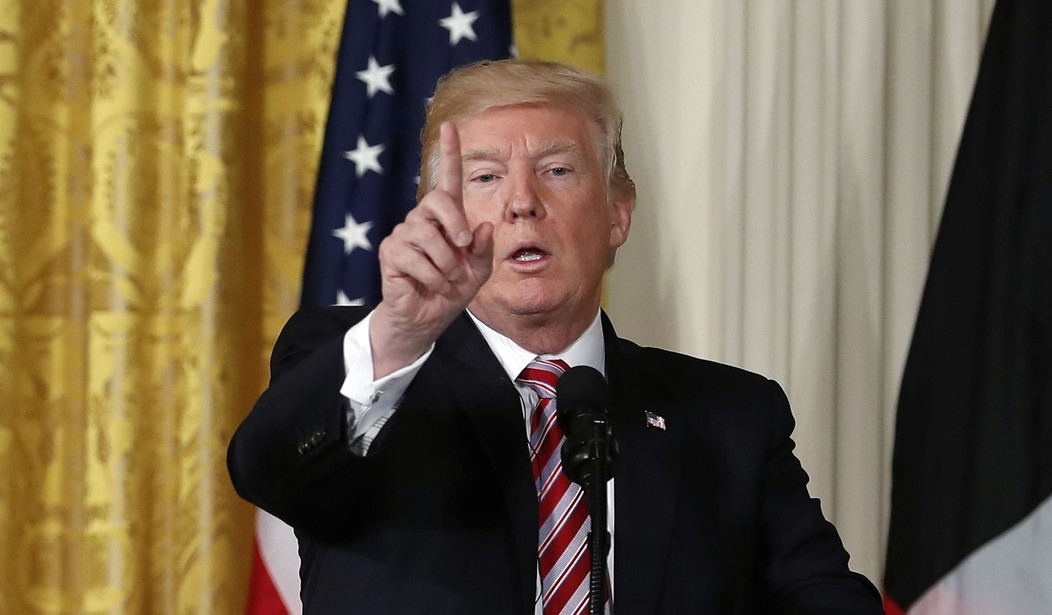A small detail, but a highly relevant one, potentially. When President Trump announced his administration's decision to rescind his predecessor's unconstitutional 'DACA' executive action, he urged Congress to fix the problem within six months. During that time window, he said, the status quo would prevail -- a point he reiterated at Nancy Pelosi's urging. Pelosi also told reporters that Trump had pledged to her that he would sign a bipartisan version of the DREAM Act in order to codify Obama's unilateral power-grab through legitimate legislative action. As I wrote ahead of the formal DACA announcement, there seemed to be a fairly obvious compromise in the offing: Democrats would agree to new border security and internal enforcement provisions, and Republicans would agree to make permanent the non-deportable status of otherwise law-abiding DREAMers. Both of those would-be provisions enjoy strong consensus support among voters, and could easily be paired into an broadly-appealing reform bill. Chuck Schumer initially signaled that his party would only settle for a "clean" DREAM Act, with nothing else attached, but other Democrats quickly started moving away from that position.
But even if Schumer and Pelosi's rank-and-file were willing to resolve the DACA issue (it's a powerful talking point they'd have to relinquish, after doing nothing for DREAMers when they last controlled Congress), how Republicans would play things remained an open question. Though many are on the record in favor of a DREAM Act compromise, Sen. Marco Rubio hit the nail on the head when he said early and often that guidance from the White House would be vital to the process. Why? The GOP needed an indication as to what sort of bill the president would be willing to sign into law, and Trump's support may well determine whether Republican leaders are able to marshal the requisite votes from their own conferences:
On DACA, Rubio awaiting WH guidance on legislative 'red lines.' In terms of what he'd support, MR says he won't rule anything 'in or out.'
— Guy Benson (@guypbenson) September 6, 2017
Rubio reiterated: No sense drafting bill that can't pass/wouldn't get signed. Said time is of the essence. Seemed eager to fix DACA issue. https://t.co/Gg2nQFEUwP
— Guy Benson (@guypbenson) September 7, 2017
If Trump announced that yes, he'd sign the DREAM Act -- but only if Democrats conceded on wall funding -- that would be a nonstarter across the aisle. Would talk of a compromise get killed off by a "poison pill" presidential insistence? No, says the White House:
JUST IN: White House: Trump won't demand border wall funding in new DACA bill https://t.co/hYn7hMtHQZ pic.twitter.com/oOkRcoIKLt
— The Hill (@thehill) September 12, 2017
White House legislative affairs director Marc Short told reporters on Tuesday that President Trump would not demand that border wall funding is tied to a legislative replacement for the Deferred Action for Childhood Arrivals (DACA) program. Speaking at a roundtable event hosted by the Christian Science Monitor, Short said the administration didn’t want to “bind” itself by making a demand that would likely be a nonstarter for many lawmakers. “We’re interested in getting border security and the president has made the commitment to the American people that a barrier is important to that security,” Short said. “Whether or not that is part of a DACA equation, or ... another legislative vehicle, I don’t want to bind us into a construct that would make the conclusion on DACA impossible.”
Recommended
White House officials' posture here is reasonable and constructive. Trump isn't backing off the wall in general, they hasten to add, but he's not adamant about it being part of this specific negotiation. And the House's most conservative caucus is on board with that approach, too:
“The president is not backing off a border wall,” he said. “The president is committed to sticking by the commitment that a physical structure is needed ... whether that is part of a DACA package or another package, I won’t prejudge that today, but he’s committed to getting that wall built.” Short's comments echo House Freedom Caucus Chairman Mark Meadows (R-N.C.), who similarly said last week that he wouldn't demand border wall funding be tied to DACA legislation. “I don’t know that it’s border wall funding, but it’s certainly a secure southern border,” Meadows told reporters on Thursday.
The upshot of all of this is that the ingredients for a successful passage of a DREAM-Act-plus-enforcement package are all in place. With two of the biggest potential impediments to a deal (dead-end Trump demands and entranched conservative opposition) out of the way, it seems as though the likelihood of this happening has increased substantially. Parting thought: Can you imagine if Donald Trump's first major bill signing is an immigration reform law that includes an amnesty? Better start imagining it.

























Join the conversation as a VIP Member